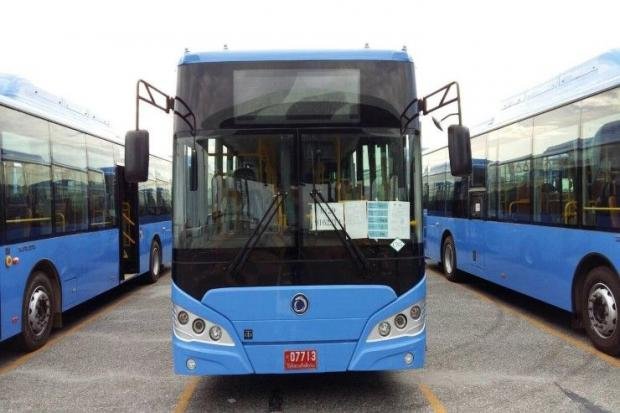
The Customs Department has impounded 100 natural gas vehicle (NGV) air-conditioned buses which were supposed to hit Bangkok streets late this month amid doubts over whether the import order is legitimate or was falsely declared to avoid more than 100 million baht in tax.
The first lot of 100 buses procured by the Bangkok Mass Transit Authority (BMTA) arrived at Laem Chabang port on Dec 1. The remaining 389 will be delivered by Dec 29. The buses were procured from Bestlin Group in a deal worth 3.3 billion baht.
Chaiyut Kumkun, deputy director-general of the department, said Tuesday the vehicles were imported with a document asserting the vehicles originally came from Asean countries, or so-called Form D, which means the buses would be exempt from import duty under the Asean Free Trade Area (Afta). Super Zara Co handled the import procedure.
However, customs authorities found the buses were not manufactured in Malaysia as claimed but come from China, and should not be subject to the tax exemption, Mr Chaiyut said.
If the vehicles were made in Malaysia as claimed, they would be eligible for a 40% import duty exemption, or 1.2 million baht each, plus 7% value-added tax (VAT). Mr Chaiyut said one of the buses arrived first and the other 99 followed later.
The first bus was shipped from China to Malaysia, based on the serial number of its container, and then delivered to Thailand. The same procedure also applied to the rest. Based on its investigation, the department suspected the vehicles were probably not produced in Malaysia, he said.
The department would contact Malaysian authorities to determine whether the buses were produced there, he said, adding customs officials could visit the assembly plant. The investigation should take about a month, Mr Chaiyut said. Super Sara has no previous import record with the department, Mr Chaiyut noted.
It is unclear whether the Form D is genuine, but more importantly, officials need to find out whether the buses were made in either China or Malaysia, he said. Any importer found to breach customs laws faces a fine four times the price of the products, about three million baht each, plus import duty.
Kanist Srivachiraprapa, president of the Bestlin Group, said customs officials have demanded a blueprint of the bus assembly from the plant in Malaysia.
The company said it had to pay 300,000 baht each day for parking the arrived buses at the port.